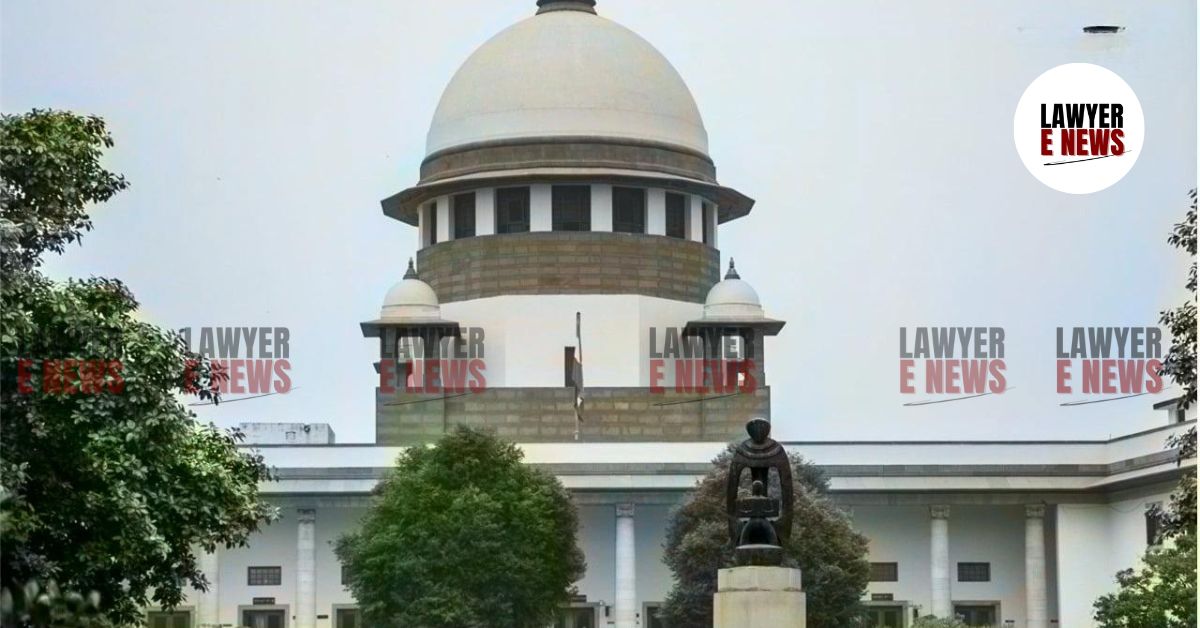-
by Admin
16 February 2026 1:47 PM



“In corruption cases involving public servants, stay of conviction seriously undermines public confidence in the justice system… such discretion should be exercised sparingly and only in exceptional circumstances” — Supreme Court of India, comprising Justice Sandeep Mehta and Justice Prasanna B. Varale, dismissed a Special Leave Petition (Criminal) Diary No. 4666 of 2025, filed by a public servant convicted under the Prevention of Corruption Act, 1988 (PC Act).
The Court upheld the order passed by the High Court of Gujarat at Ahmedabad, which had suspended the sentence but refused to stay the conviction. Declining to interfere, the Supreme Court observed:
“There is no infirmity in the impugned order… The law is well-settled that courts should refrain from staying convictions of public servants convicted for corruption unless exceptional circumstances exist.”
Citing authoritative precedents including K.C. Sareen v. CBI, Chandigarh (2001) 6 SCC 584 and CBI v. M.N. Sharma (2008) 8 SCC 549, the Court reiterated that stay of conviction is not a matter of routine discretion, particularly in corruption cases involving public servants.
The petitioner, Raghunath Bansropan Pandey, a public servant, was convicted by the Trial Court for offences under Section 7 read with Section 12 and Section 13(1)(d) read with Section 13(2) of the Prevention of Corruption Act, 1988.
He was sentenced to three years imprisonment under Section 13(1)(d) read with Section 13(2), and two years under Section 7 read with Section 12 of the PC Act.
While entertaining the petitioner’s appeal against conviction, the High Court of Gujarat suspended the sentence but explicitly declined to stay the conviction, stating that:
“Suspension of sentence shall not be construed as a stay of conviction.”
Aggrieved by this, the petitioner approached the Supreme Court, seeking a stay of conviction, arguing that the refusal prejudices his service rights and employment.
“Courts Must Be Extremely Cautious In Granting Stay On Conviction In Corruption Cases” — Supreme Court Reiterates the Principle
The Bench categorically observed that the law on this point is “crystal clear”. Referring to the landmark ruling in K.C. Sareen v. CBI, the Court quoted the settled principle:
“When a public servant is found guilty of corruption by a court, stay of conviction should not be granted casually or mechanically. Such an act seriously affects the moral fabric and confidence of the public in the justice delivery system.”
The Court further emphasized, relying on CBI v. M.N. Sharma, that:
“Staying a conviction, particularly in corruption cases, cannot be treated as a procedural formality to prevent job loss or administrative consequences faced by the convicted public servant. Public interest weighs higher in the balance.”
“No Exceptional Circumstances Shown To Warrant Deviation From Settled Law” — Supreme Court On Facts Of The Case
Rejecting the petitioner’s argument, the Bench held:
“Ex facie, we find no justifiable reason to take a different view. The impugned order passed by the High Court refusing to stay conviction does not suffer from any infirmity warranting interference.”
The Court found that the petitioner failed to demonstrate any “exceptional circumstances”, which is the strict threshold required for granting a stay of conviction in corruption matters.
“Conviction Stay Is Not A Right — It’s An Exception, Not The Rule” — Supreme Court Highlights Judicial Caution
Underscoring the public policy aspect, the Court noted:
“Judicial discretion in granting a stay of conviction must be exercised sparingly and only in rare cases. Otherwise, the very object of the Prevention of Corruption Act, aimed at curbing corruption among public servants, would be defeated.”
The Bench observed that allowing routine stay of conviction would send a wrong signal to society and dilute the deterrent purpose of anti-corruption laws.
Dismissing the petition, the Supreme Court concluded in unequivocal terms:
“That being the situation, we are of the firm opinion that the impugned order does not suffer from any infirmity warranting interference. The Special Leave Petition, being devoid of merit, is hereby dismissed. Pending applications, if any, shall stand disposed of.”
This judgment stands as a strong reaffirmation of the judicial policy against granting stay of conviction in corruption cases involving public servants. It reinforces that while suspension of sentence may be granted pending appeal, the stigma of conviction remains unless and until overturned by the appellate court.
Date of Decision: 19 June 2025
